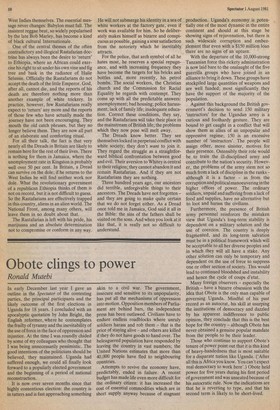Obote clings to power
Ronald Mutebi
In early December last year I gave an outline in the Spectator of the contesting parties, the principal participants and the likely outcome of the first elections in Uganda for 18 years. I concluded with an apocalyptic quotation by John Bright, the English reformer, where he contemplates the frailty of tyranny and the inevitability of the use of force in the face of oppression and injustice. At the time I was roundly chided by some of my colleagues who thought that I was being unnecessarily pessimistic. The good intentions of the politicians should be believed, they maintained. Uganda had suffered enough, we could all finally look forward to a popularly elected government and the beginning of a period of national reconstruction.
It is now over seven months since that highly contentious election: the country is in tatters and is fast approaching something akin to a civil war. The government, insecure and sensitive to its unpopularity, has put all the mechanisms of oppression into motion. Opposition members of Parliament are behind bars, the independent press has been outlawed. Civilians have to endure endless roadblocks where unruly soldiers harass and rob them — that is the price of staying alive — and others are killed if they do not have goods to hand over. The beleaguered population have responded by leaving the country in vast numbers; the United Nations estimates that more than 40,000 people have fled to neighbouring countries.
Attempts to revive the economy have, predictably, ended in failure. A recent budget has made life even more difficult for the ordinary citizen: it has increased the cost of essential commodities which are in short supply anyway because of stagnant production. Uganda's economy is potentially one of the most dynamic in the entire continent and should at this stage be showing signs of rejuvenation, but there is such widescale corruption and embezzlement that even with a $150 million loan there are no signs of an upturn.
With the departure of the 10,000-strong Tanzanian force this rickety administration is now laid bare to the onslaught of the five guerrilla groups who have joined in an alliance to bring it down. These groups have stockpiled large quantities of weapons and are well funded; most significantly they have the support of the majority of the population.
Against this background the British government's decision to send 150 military 'instructors' for the Ugandan army is a curious and foolhardy gesture. They are bound to get caught in a conflict that will show them as allies of an unpopular and oppressive regime; 150 is an excessive number of 'instructors'. The people will assign other, more sinister, motives for their presence. Ostensibly their role would be to train the ill-disciplined army and contribute to the nation's security. However, the problems of the army stem not so much from a lack of discipline in the ranks— although it is a factor — as from the corruption and political manoeuvering in the higher offices of power. The ordinary soldiers, unpaid and suffering from a lack of food and supplies, have no alternative but to loot and harass the civilians.
Furthermore, the presence of British army personnel reinforces the mistaken view that Uganda's long-term stability is dependent on a military solution and the use of coercion. The country is deeply fragmented, and its long-term salvation must be in a political framework which will be acceptable to all her diverse peoples and in which they will all have a stake. Any other solution can only be temporary and dependent on the use of force to suppress one or other section of society. This would lead to continued bloodshed and instability and hence the cycle of coups d'etat.
Many foreign observers — especially the British — have a bizarre obsession with the idea that Obote is the only man capable of governing Uganda. Mindful of his past record as an autocrat, his skill at usurping the institutions of democracy and dazzled by his apparent indifference to public opinion, they conclude that this is the best hope for the country — although Obote has never obtained a genuine popular mandate from the people to be their leader.
Those who continue to support Obote's tenure of power point out that it is this kind of heavy-handedness that is most suitable for a disparate nation like Uganda. (`After all this is Africa you know. You can't expect real democracy to work here'.) Obote held power for five years during his first period of government and was unseated because of his autocratic rule. Now the indications are that he is reverting to type, and that his second term is likely to be short-lived.


































 Previous page
Previous page